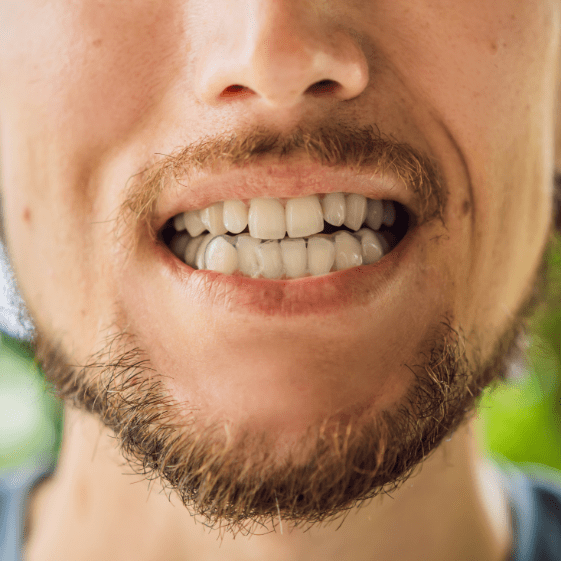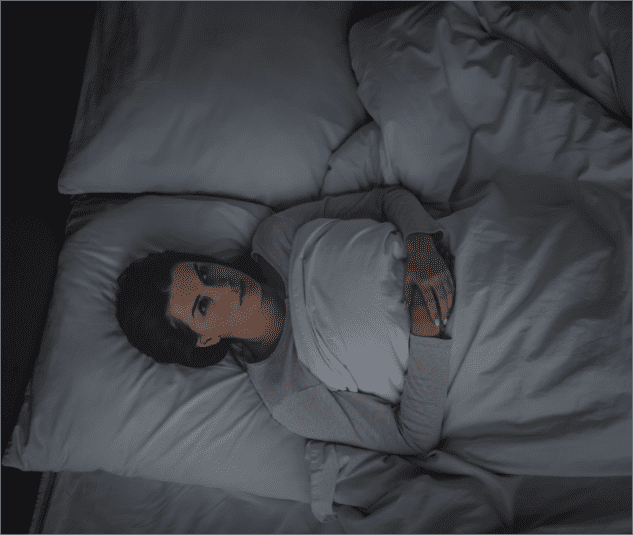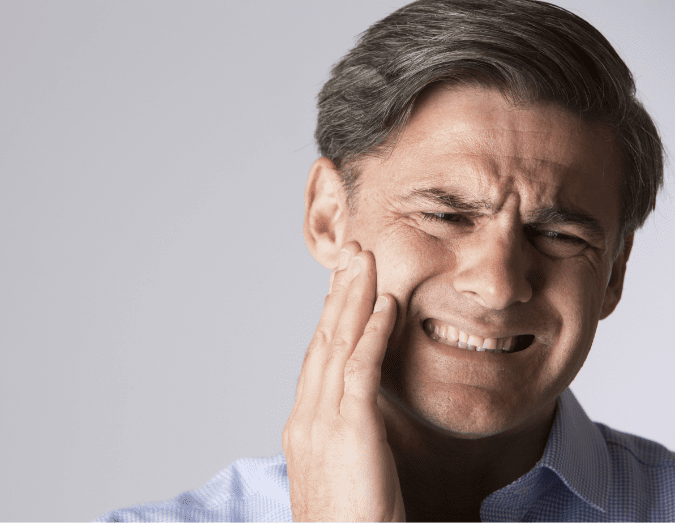What are the Primary Causes of Bruxism?
The Definition of Bruxism

Both cause similar problems, with clenching being responsible for jaw soreness and pain, while grinding accelerates tooth wear and tooth flattening. In extreme cases, teeth become shorter, which adds to the pain and soreness of the muscles of the jaw and temples.
Primary Bruxism
Awake Bruxism
Awake bruxism is a type of involuntary teeth grinding that occurs while a person is conscious, often during times of stress or anxiety.
Awake bruxism is a very common condition affecting over 22% of the general population. Children aged 3-10 are at greater risk of bruxism while awake, but it also affects about 20% of adults, worsens during the day, and can trigger the onset of bruxism at night during sleep.
Sleep Bruxism
Sleep bruxism, also called nocturnal bruxism, is characterized by involuntary grinding and clenching of the teeth during sleep and is found in 12% of persons across all age groups.
It is the most common type of bruxism in adults, and it is estimated that 8-31% of adults suffer from sleep bruxism, and it is worse during the morning right before waking.
Secondary Bruxism
Secondary bruxism is a type of teeth grinding or clenching resulting from an underlying medical or psychological condition. It is different from primary bruxism, which occurs without any underlying cause.
The underlying conditions that can cause secondary bruxism include sleep disorders, medication side effects, and neurological or musculoskeletal conditions.
Secondary bruxism can cause damage to teeth, jaw pain, headaches, and other related symptoms. Identifying and addressing the underlying condition causing the disorder is important to effectively treat and manage it.
Symptoms of Sleep Bruxism and Awake Bruxism
- Teeth grinding or clenching that is loud enough to wake up a partner or cause jaw pain
- Teeth that are worn, chipped, or flattened
- Tooth sensitivity or pain
- Headaches, particularly in the temples or in a hatband shape around the head.
- Jaw pain, stiffness, or discomfort
- Earache or pain that resembles an ear infection
- Disrupted sleep or insomnia
- Neck or facial pain
Diagnosis of Bruxism
It’s important to first get an official diagnosis for awake or nocturnal bruxism from a dentist or physician.
A dentist will observe tooth wear with a dental exam and by comparing bite records from a previous visit. The Bruxism Status Questionnaire (BSQ) may also be used to establish the presence of the condition.
A physician may use a questionnaire or order an overnight polysomnography(PSG) to identify bruxism and objectively measure severity and frequency.
Consulting a doctor can be beneficial if you suspect teeth grinding or clenching, as they can assist in managing the condition and preventing additional harm.
Common Bruxism Causes
Psychosocial Factors
As explained above, bruxism can be primary or secondary based on its causes. Most primary cases come from psychosocial and psychological factors.
While the relationship between bruxism and psychosocial factors can be complex, experts generally conclude that the following factors contribute the most:
Stress and Anxiety
The body’s “fight or flight” response, triggered by stress and anxiety, can lead to teeth grinding.
This response may result in heightened muscle tension, potentially impacting various muscle groups, including those in the jaw, which may cause teeth clenching and grinding. Stress and anxiety have the potential to interfere with sleep, leading to an increased probability of clenching and grinding while sleeping.

The frequent clenching and grinding habit can cause dental issues, such as wear and tear on teeth, chipping, and eventual tooth loss.
Relaxation techniques, exercise, and therapy to manage stress and anxiety have been shown to decrease the occurrence of bruxism.
Aggression and Anger
Similar to stress, anger, and acts of aggression are psychosocial factors that regularly lead to clenching of the jaw and face, triggering bruxism episodes.
If an individual is constantly in situations where they are made to feel anger and act aggressively towards others, then bruxism can develop.
Being constantly in a state of anger feeds stress and anxiety, leading to a vicious cycle of gnashing, grinding, and clenching that can damage your jaw muscles and teeth.
Night Terrors
Night terrors can lead to bruxism due to the intense physical and emotional stress they cause during sleep.
Night terrors are a type of sleep disorder characterized by sudden awakenings from a deep sleep, often with screaming, sweating, or other signs of extreme distress.
During a night terror, an individual may involuntarily clench or grind their teeth as a result of the intense physiological and emotional response.
Over time, this behavior can become habitual. Worse, the disrupted sleep caused by night terrors and other psychosocial factors can add to the condition, as a lack of restful sleep can increase muscle tension and increase bruxism episodes.
Depression
Muscle tension, including in the jaw, can occur when a person with depression is experiencing the negative emotions of sadness, hopelessness, and anxiety.
Teeth clenching and grinding can occur during both waking and sleeping hours as a result of this heightened tension.
Depression is then made worse by the lack of sleep. Both the underlying condition and the symptoms of bruxism can be better managed when depression is treated with therapy, medication, or other treatment methods prescribed by a healthcare professional.
Medical Factors
Underlying medical conditions can lead to bruxism, especially those that exacerbate muscle tension and pain or those that disrupt the sleep cycle and worsen anxiety. In many cases, the medications used to treat these conditions have bruxism as a side effect.
Genetic factors are also important, as most people who have had parents or older family members with this condition are at a higher risk of bruxism.
Sleep Disorders

Parkinson's Disease
Parkinson’s disease can lead to bruxism due to the motor symptoms associated with the condition. Parkinson’s disease is a neurodegenerative disorder that affects the brain’s ability to control movement, resulting in tremors, stiffness, and difficulty with coordination.
Obsessive-compulsive Disorder
Anxiety disorder in which the sufferer is plagued by compulsive urges to act on unwanted and intrusive thoughts, feelings, ideas, sensations (obsessions), or behaviors (compulsion). Both the anxiety and the negative reactions to the serotonin reuptake inhibitors used to alleviate this condition can lead to bruxism.
Occlusal Factors
Malocclusion, which is the abnormal alignment of the teeth and jaws, can lead to bruxism. When the teeth and jaws do not align properly, it can cause uneven pressure on the teeth, which is an occlusal factor causing clenching and grinding.
Additionally, malocclusion can cause muscle imbalances, further increasing the likelihood of bruxism. Over time, chronic bruxism can make dental problems worse and may require corrective orthodontic treatment to address the underlying malocclusion.
In some cases, a dentist may also prescribe a custom-made mouth guard, also called occlusal splints, to help protect the teeth from damage while undergoing orthodontic treatment.
Gastroesophageal reflux (GERD)
Some people’s habit of teeth-grinding is influenced by gastroesophageal reflux disease (GERD). GERD is the reflux of stomach acid into the esophagus, a common condition characterized by irritation and inflammation, and damage to the esophagus, pharynx, and respiratory tract.
The acid can also rise to the level of the mouth, where it can cause tooth erosion and other dental issues.
This wear and tear on teeth can cause malocclusion, or a misaligned bite, which in turn can cause bruxism. Additionally, bruxism symptoms can be made worse because of the discomfort and pain associated with GERD, which can cause people to clench or grind their teeth
Other Risk Factors
Unhealthy habits like excessive caffeine, alcohol, tobacco, and drug consumption can amplify stress and anxiety, and disrupt sleep, which then results in bruxism.
These substances can interfere with normal sleep patterns, leading to disruptions in muscle relaxation and an increase in muscle activity, including the jaw muscles. Alcohol can also cause dehydration, which can exacerbate the symptoms of bruxism.
Caffeine and drug stimulants such as amphetamines can increase the body’s arousal level, leading to heightened muscle tension and increased bruxism episodes.
Tobacco use can cause an increase in oral and facial muscle tension, which can also contribute to the development of bruxism. In some cases, reducing or eliminating the use of these substances may help reduce the frequency and severity of bruxism episodes.
Your doctor will undoubtedly prescribe a total stop to consuming these substances when treating bruxism.
Complications
While it may seem like a harmless habit, bruxism can lead to a range of complications if left untreated. Over time, the constant tooth grinding and clenching of teeth can cause damage to the teeth and jaw, leading to pain, sensitivity, and even tooth loss.
Furthermore, it can lead to tension-type headaches, earaches, and facial pain, as well as disrupt sleep patterns and cause fatigue.
Effects on Jaw Muscles
Bruxism and constant jaw clenching can contribute to the development of dental problems. One of them is temporomandibular joint disorder (TMJ), a condition that affects the joint connecting the jawbone to the skull, causing jaw pain, discomfort, and limited mobility in the jaw.
Effect of Tooth Grinding
Bruxism can negatively affect tooth health, including tooth enamel loss, chipping or cracking of teeth, and increased sensitivity to hot or cold temperatures. It can also lead to gum recession, which can make the already sensitive teeth more vulnerable to decay and infection.

Treatment and Management of Bruxism
If you are experiencing symptoms of bruxism, it’s important to seek treatment as soon as possible. Several options are available for the treatment of bruxism, ranging from simple lifestyle changes to more advanced dental treatments.
Home Care Remedies
Some mild cases of the clenching of teeth and tooth grinding associated with bruxism can be treated right away with simple home remedies, such as:
- Heat or ice on jaw muscles.
- Avoiding tough foods at all costs.
- Kicking the habit of chewing gum.
- Take in plenty of fluids.
- Perform some facial stretches.
- Relax your facial and neck muscles with a massage or warm bath.
- Put your face and jaw at ease.
Oral Appliances, Night Guard and Splints
For more extreme cases of bruxism, most dentists will use a night guard or mouth guard for all-day treatment of bruxism. Also called occlusal splints, these devices create a protective barrier between the upper and lower teeth, which helps to absorb the force of grinding and clenching. They are typically made of hard acrylic or soft material and are custom-fitted to the patient’s teeth.
By wearing a night guard or splint during sleep, people with sleep bruxism can help reduce the damage at night caused by clenching of teeth and grinding, including tooth wear, chipping, and sensitive teeth.
These devices do not address the underlying causes of bruxism, such as stress or anxiety, and should be used in conjunction with other treatments recommended by a healthcare professional.
Regular dental check-ups and maintenance of the night guard or splint are also important to ensure its effectiveness and longevity.
Improved Health
As mentioned above, simply changing many habits can significantly lessen your risk of bruxism. Eliminate alcohol, caffeine, and too much sugar from your diet, and work hard to sleep an adequate amount of time. Quitting smoking is a must, as well as stopping any consumption of stimulant drugs. Medical conditions such as GERD should be treated with the proper medication and lifestyle changes or other treatment methods prescribed by a healthcare professional.

Psychological therapy
Managing night terrors, anxiety, and stress may involve something as common as seeking the help of a therapist and learning about stress management and techniques to relieve anxiety. Bruxism might only be one consequence of a larger psychological problem that a patient needs to address.
Muscle Relaxants or Antidepressants
Muscle relaxants such as cyclobenzaprine and diazepam are commonly used to treat bruxism by reducing muscle tension and helping to relax the jaw muscles.
Antidepressants such as tricyclic antidepressants (TCAs) and selective serotonin reuptake inhibitors (SSRIs) are also sometimes used to treat bruxism, as they can help alleviate anxiety and stress.
However, it’s important to note that these medications are not specifically designed to treat bruxism, and their effectiveness in managing the condition can vary from person to person.
Medication use should always be supervised by a healthcare professional who can monitor its effectiveness and potential side effects.
Frequently Asked Questions
What are the teeth most affected by bruxism?
Bruxism can affect any teeth in the mouth, but it most commonly affects the molars and premolars, located at the back, where most of the grinding and chewing happens and where the most force is applied during clenching. The incisors and canines at the front can also be affected, mainly if the bruxism involves a side-to-side grinding motion.
Is bruxism a dental issue or a medical issue?
No doubt, bruxism is both a dental issue and a medical issue because of how the condition can result from a wide array of medical issues, including mental and physical health.
However, you should start by seeing a dentist to get a proper diagnosis and recommendations for care. Dentists can comprehensively evaluate your teeth, gums, and jaw to ascertain the severity of the problem because they are trained to recognize the signs and symptoms of bruxism, such as tooth wear, enamel erosion, and jaw pain. In addition, they can fit you for a night guard or splint that will protect your teeth from damage and alleviate the discomfort of bruxism.
Can vitamins help with bruxism?
While no specific vitamin or mineral supplement is known to cure bruxism, maintaining a healthy and balanced diet that includes adequate amounts of vitamins and minerals may help support overall dental health and reduce the risk of tooth damage from bruxism.
For example, calcium and vitamin D are essential for maintaining strong and healthy teeth and bones and may help to reduce the risk of tooth wear and fracture caused by bruxism. Some studies have suggested that magnesium supplements may help reduce muscle tension and promote relaxation, which could help alleviate some of the symptoms associated with bruxism. Nonetheless, only your physician can determine the right treatment for you and see if you’re in need of supplements and vitamins.
What age is bruxism more common?
Overall, bruxism is more common in children than adults, with the median age being 10 to 14 years, but it’s by no means a children-only problem. Most children grow out of it by their teens, and adults who suffer from it typically do so because of underlying medical problems or severe stress and anxiety in their lives.
How do you sleep to prevent teeth grinding?
While there is no surefire way to avoid grinding your teeth or clenching your jaw while you sleep, you can take some preventative measures.
Work on sticking to a regular bedtime routine, winding down before turning in, and keeping your bedroom dark and quiet.
Avoid caffeine and alcohol before bedtime, and create a relaxing sleep environment to reduce stress and tension that can contribute to bruxism.
Get Diagnosed and Treated
If there’s one thing to take from the causes of bruxism, is that it’s common and can have a variety of underlying causes, including stress, anxiety, sleep disorders, medication use, and dental problems. Nonetheless, treat as soon as possible.
Chronic teeth grinding and jaw clenching can lead to several serious complications, such as tooth wear and fracture, temporomandibular joint (TMJ) dysfunction, and chronic pain.
Therefore, if you experience any signs of bruxism, you must get help. It is possible to improve dental health and prevent or lessen the risk of long-term complications by addressing the underlying causes of bruxism and protecting the teeth and jaw from damage.

